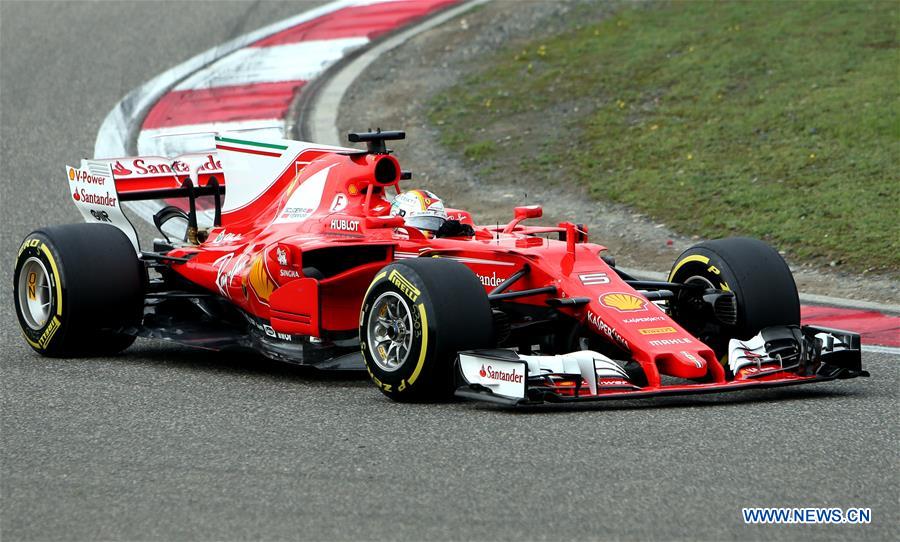Race is on for China's 1st Formula One star
 0 Comment(s)
0 Comment(s) Print
Print E-mail China Daily, April 25, 2019
E-mail China Daily, April 25, 2019

While the Shanghai International Circuit hosted the 1,000th Formula One grand prix race recently, and the sport enjoyed huge exposure in China, people asked whether a Chinese driver will soon compete at the highest level.
Experts say it is simply a matter of "money and talent".
"Drivers must meet certain standards before they can secure a license to participate in F1, hence all drivers need to have a certain degree of talent," said Simon Chadwick, professor of sports enterprise at the University of Salford in Manchester.
Renault Sport Academy Director Mia Sharizman said early exposure to competitive racing increases the chance of young drivers being picked up by F1 teams, but such exposure requires funding.
Sharizman, who recruited 19-year-old Zhou Guanyu as Renault manufacturing team's development driver, said: "Kids can start to go carting at the age of 8, and the minimum age of driving formula cars is 15 years old.
"Formula One teams will choose potential candidates to support and develop when the junior drivers are at the age of 16 to 18, which means from 8 to 16, families who want their children to pursue the F1 dream will have to frequently send their kids to Europe for racing, which requires significant financial backing on top of the talent."
Mark Dreyer, a Beijing-based sportswriter who edits the China Sports Insider website, holds the opinion that, in the incredibly expensive motor sport world, many drivers earn their positions on teams not solely because of their talent, but because of the money they can bring to a team.
"There have been more than a few examples of drivers who have raced, but not up to scratch behind the wheel," he said. "The point is that it's still possible to 'buy' a seat in F1 and it is perhaps surprising that none of the large Chinese corporate entities have chosen to pursue this route, given the huge amount of international prestige that Formula One enjoys."
While a Chinese driver with significant financial backing would be an attractive proposition for teams that struggle to fund their participation in F1, Chadwick said a Chinese driver entering F1 could also be a strategic proposition for a team, such as in the case of Renault's decision to take on Zhou.
In recent years, a few Chinese names have emerged in F1. Chinese driver Ma Qinghua's appearance for the HRT F1 team, on a practice run at the Italian Grand Prix in 2012, was one, and, in 2015, Hong Kong driver Adderly Fong Cheunyue was appointed a test driver on the Lotus F1 Team.
China's growing interest in F1 motor racing saw Shanghai added to the F1 calendar in 2004. The sport's organizers are considering adding a second race in China, to grow the sport in one of its most important markets. But, so far, a Chinese national has not competed in an F1 race.
Sports pundits argue the dominance of European and North American drivers and teams reflect the way the sport has developed.
"It is based upon a car culture that dates back much more than half a century, which gave rise to a racing infrastructure consisting of circuits, teams, administrators, sponsors, and so forth. This means that an array of assets and opportunities has historically accumulated, making it easier for drivers to reach Formula One," Chadwick said.
In China, there hasn't been the same kind of racing culture or environment in which Chinese drivers can develop.
However, Chadwick said the infrastructure is developing and drivers are starting to emerge, and with commercial partners keen to be involved, the situation will start to change.
Dreyer said another aspect that has held the sport back in China is its association in the minds of some with very wealthy people, and corruption. Associations between reckless young, rich people, performance cars, and corruption have hindered the sport in getting crucial support from government, he added.
In addition, traditional Asian culture is rooted in avoiding doing dangerous things, said Sharizman.
"To have more drivers, the willingness of families to push their children is very important, but in Asia, for the last 20 to 25 years, most parents do not tend to allow kids to engage with relatively dangerous or adventurous activities, such as driving karts," Sharizman said.
However, Dreyer said, with wide exposure at all levels, this is changing.
"I have seen more grassroots efforts, with racing improving across the board, from go karts and above," he said. "That's a good sign and it bodes well for the future."
As for how young Chinese drivers should chase their F1 dreams, Renault's Australian star driver Daniel Ricciardo said the key is to be in Europe where there is a platform for the sport.
"I was in a similar position coming from Australia. It is very isolated to the world of F1 and I imagine China is the same," he said. "Really, it's about making that step, I think, to Europe. That was a big thing for me. Putting yourself in the spotlight, putting yourself against the best upcoming kids, a lot of them, and try to see how they go."






Go to Forum >>0 Comment(s)